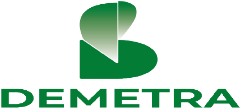NEWS
11/03/2022
New weekly column: THE IMPORTANCE OF NUTRITION, a journey to analyze the essential nutritional elements for crops and DEMETRA's products which aim to keep the plants well balanced, strong and productive.
1 - NUTRITION: WHAT ARE THE MAIN ELEMENTS?
As is known, plant nutrition is controlled by Sprengel and Von Liebig's law of the minimum. According to this law, the absence or limited availability of a nutritional element is enough to compromise the development and growth of the plant organism. It is essential that all the elements are present and available in minimal quantities to keep the plant in balance and guarantee its productivity and well-being. But what are these elements and how are they classified?
The essential nutrients for crops are divided into three classes:
Macroelements: NITROGEN, PHOSPHORUS, POTASSIUM AND SULFURMesoelements: MAGNESIUM, CALCIUM
Microelements: IRON, MANGANESE, BORON, ZINC, COPPER, MOLYBDENUM
Depending on the function performed within the plant, we can reclassify these elements into three other groups:
- Plastic elements (H, O, C, N, P, S): they are involved in construction of plant tissues and in the development of vegetation and in growth of the plant. Besides Nitrogen, Phosphorus and Sulfur, we also find in this class other elements needed for organic synthesis: oxygen, hydrogen and carbon;
- Catalytic elements (Fe, Mn, Zn, Cu, Mo): elements that act in the production of enzymes in the cell, which accelerate chemical reactions;
- Dynamic elements (K, Mg, Ca): regulate water and root absorption.
Nutritional uptake affects the state of wellness of the plants and it depends on different parameters:
– uptake rate of each single element, depending also on product's formulation;
- physical characteristics of soil such as its structure, pH, presence or not of mineral elements ready to be absorbed;
- moisture of the soil;
- rate of organic substance (essential) and biological fertility of soil (active rhizosphere).
Fertilization could be both foliar or in fertigation with liquid or water soluble products.
Prevention is the best cure: to avoid imbalances within the plant and therefore undertake a correct nutritional path that ensures productivity and longevity it is necessary to proceed with a complete and personalized fertilization program that takes into account foliar analyzes, the necessity of a continuous organic intake, a rational anti-cryptogamic defense plan (Cu, Zn, S), an evaluation of the chemical composition of water used, salinity of the final solution (for fertigation applications). It is very important to choice the most appropriate formulation according to the necessity of every single crop.
DEMETRA offers targeted advice with highly qualified technicians and many products for every nutritional need.
CLICK HERE to contact our specialists!
CONTATTACI
Demetra Italia s.r.l. | box@demetraitalia.it | tel. +39 0542 670170 | Via San Vitale, 5 - Imola (BO) Italia | Stabilimento: Via delle Arti, 6 - Castel Guelfo (BO) Italia | P.IVA: IT00596661207
